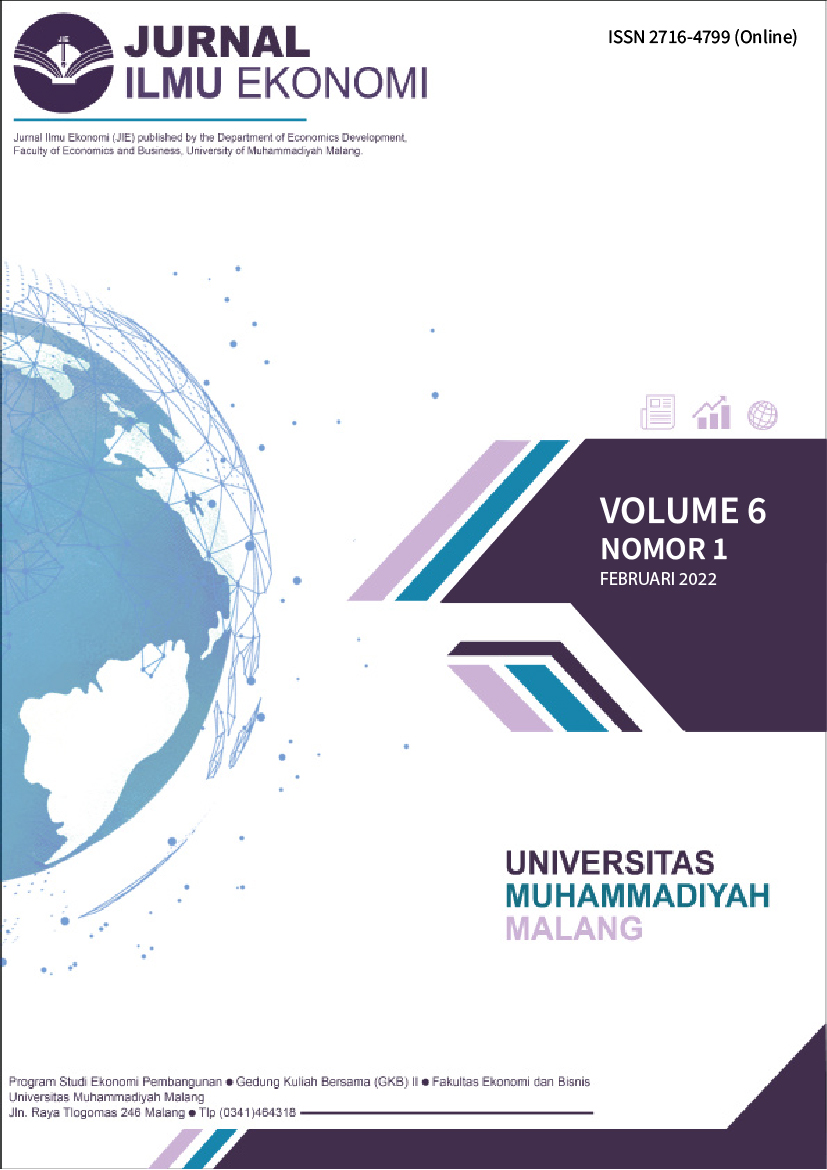Analisis Pengaruh Pertumbuhan Ekonomi, Tingkat Pendidikan dan Kesehatan Terhadap Jumlah Penduduk Miskin di Bali Tahun 2011-2020
DOI:
https://doi.org/10.22219/jie.v6i1.19670Abstract
This study aims to determine the effect of economic growth, level of education and health on the number of poor people in the Regency/City of Bali Province. In this study, the high poverty rate in the Regency/City of the Province of Bali is a problem that will be studied. The method used in this study is a quantitative panel data method with the help of software eviews 9. The data used is secondary data, using panel data methods (cross-section) and (time series). The period in this analysis is 2007-2016 and 9 districts/cities in the province of Bali. The results showed that simultaneously the variable economic growth (X1) had a positive and significant effect on the number of poor people in the Regency/City of Bali Province. Meanwhile, the education level variable (X2) and the health variable (X3) have a negative and significant effect on the number of poor people in the Regency/City of Bali Province.
This study aims to determine the effect of economic growth, level of education and health on the number of poor people in the Regency/City of Bali Province. In this study, the high poverty rate in the Regency/City of the Province of Bali is a problem that will be studied. The method used in this study is a quantitative panel data method with the help of software eviews 9. The data used is secondary data, using panel data methods (cross-section) and (time series). The period in this analysis is 2007-2016 and 9 districts/cities in the province of Bali. The results showed that simultaneously the variable economic growth (X1) had a positive and significant effect on the number of poor people in the Regency/City of Bali Province. Meanwhile, the education level variable (X2) and the health variable (X3) have a negative and significant effect on the number of poor people in the Regency/City of Bali Province.
Downloads
References
Amir, A., & Hardiani, H. (2013). Faktor-Faktor yang Mempengaruhi Kemiskinan dan Pengangguran di Kota Jambi. Jurnal Perspektif Pembiayaan Dan Pembangunan Daerah, 1(2), 109–120. https://doi.org/10.22437/ppd.v1i2.1500
Arsyad, L. (2016). Ekonomi Pembangunan (5th ed.). UPP STIM YKPN.
Barika, B. (2015). Pengaruh Pertumbuhan Ekonomi, Pengeluaran Pemerintah, Pengangguran dan Inflasi Terhadap Tingkat Kemiskinan di Provinsi se Sumatera. 27–36.
Fosu, A. K. (2017). Growth, Inequality, and Poverty Reduction in Developing Countries: Recent Global Evidence. Research in Economics, 71(2), 306–336. https://doi.org/10.1016/J.RIE.2016.05.005
Ghozali, I. (2013). Analisis Multivariat dan Ekonometrika, Teori, Konsep dan Aplikasi dengan Eviews 8. UNDIP.
Gujarati, D. N. (2012). Dasar-Dasar Ekonometrika buku 2 edisi 5 (Basic Econometrics) (Ed. 5). Salemba Empat.
Haughton, J., & Khandker, S. R. (2012). Pedoman Tentang Kemiskinan dan Ketimpangan (Empat). Salemba.
Kappel, R. T., & Ishengoma, E. K. (2006). Economic Growth and Poverty: Does Formalisation of Informal Enterprises Matter? SSRN Electronic Journal, 20, 1–21. https://doi.org/10.2139/SSRN.909188
Made, I., Wirawan, T., & Arka, S. (2013). Efektivitas Program Kemitraan BTCD dan dampaknya Terhadap Pendapatan dan Penyerapan Tenaga Kerja UMKM di Kabupaten Bandung. EP Unud, 4[5](1999), 546–560.
Moch. Doddy Ariefianto, author. (2012). Ekonometrika : Esensi dan Aplikasi dengan Menggunakan Eviews. Erlangga. https://lib.ui.ac.id
Mudrajat, K. (2009). Metode Riset Untuk Bisnis & Ekonomi Edisi 4. Penerbit Erlangga, Jakarta, 118.
Sitepu, R. K., & Sinaga, B. M. (2007). Dampak Investasi Sumberdaya Manusia Terhadap Pertumbuhan Ekonomi dan Kemiskinan di Indonesia: Pendekatan Model Computable General Equilibrium (the Impact of Human Capital Investment on Economic Growth and Poverty in Indonesia: Computable General Equlibriu. SOCA: Jurnal Sosial Ekonomi Pertanian, 7[2], 1–19. https://ojs.unud.ac.id/index.php/soca/article/view/4203
Smith, S. C. (2011). Pembangunan ekonomi. Jilid 1. Edisi ke-11 / Michael P. Todaro; Stephen C. Cmith; alih bahasa Agus Dharma. Erlangga.
Sukirno, S. (2011). Teori Pengantar Makroekonomi. Rajawali Press, 470. https://rajagrafindo.co.id/produk/makroekonomi-teori-pengantar-edisi-ketiga/
Suliyanto. (2011). Ekonometrika terapan: teori & aplikasi dengan spss# Suliyanto (Ed.1).
Downloads
Published
How to Cite
Issue
Section
License
Copyright (c) 2022 Pratiwi, E. H., & Malik, N.

This work is licensed under a Creative Commons Attribution-ShareAlike 4.0 International License.
Authors who publish with this journal agree to the following terms:
- For all articles published in the JIE (Jurnal Ilmu Ekonomi), copyright is retained by the authors. Authors give permission to the publisher to announce the work with conditions. When the manuscript is accepted for publication, the authors agree to the automatic transfer of non-exclusive publishing rights to the publisher.
- Authors retain copyright and grant the journal right of first publication with the work simultaneously licensed under a Creative Commons Attribution-NonCommercial-ShareAlike 4.0 International License that allows others to share the work with an acknowledgement of the work's authorship and initial publication in this journal.
- Authors are able to enter into separate, additional contractual arrangements for the non-exclusive distribution of the journal's published version of the work (e.g., post it to an institutional repository or publish it in a book), with an acknowledgement of its initial publication in this journal.
- Authors are permitted and encouraged to post their work online (e.g., in institutional repositories or on their website) prior to and during the submission process, as it can lead to productive exchanges, as well as earlier and greater citation of published work (See The Effect of Open Access).
This is an open access article and licensed under a Creative Commons Attribution-NonCommercial-ShareAlike 4.0 International License








